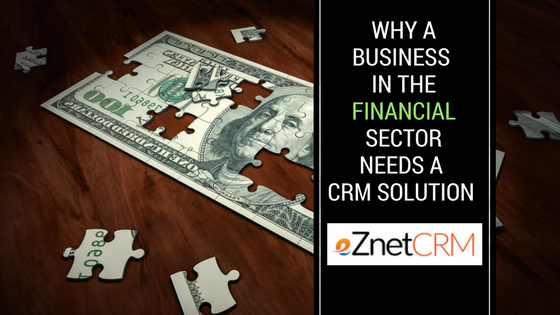Last month we covered CRM in the manufacturing industry, this month we’ll tackle the need for a CRM solution in the financial sector.
With rising customer expectations and intense competition rampant across all industries, companies are looking for ways to keep their clients happy. Financial sector companies are no different. Be it banking, institutional banking and markets, wealth management and insurance, the financial services sector is increasingly recognizing the need for CRM software to automate customer-facing processes while improving visibility and communication across the entire organization.
In addition to their unique responsibilities, financial services businesses face the routine work of lead generation, sales, marketing and customer retention that is intrinsic to the growth of every organization. A well-utilized and integrated CRM system can allow financial services companies to deliver superior service by improving document and data management, scalability, opportunity management and decision-making analytics.
Today’s customers are more demanding, and have enough options to move to a company that is ready to provide personalized care. According to the World Retail Banking Report 2016 by Capegemini and Efma, only 55% of customers say they are likely to stay with their bank for the next six months.
Why use CRM in the financial sector?
The main obstacles to becoming customer-centric in any industry are poor processes and practices – especially in the areas of communications, service and delivery. Marketing, in particular, is often identified as needing improvement, with systems a close second. Financial CRM helps manage and track all customer information in a systematic way.
Here is how a CRM solution can help your institution:
Improved customer service – With CRM software in place, all client details are readily accessible. When all interactions – such as mail, phone calls and personal meeting details are stored in the CRM system – you can provide better customer service. This contact history feature is valuable in resolving many potentially contentious issues and limiting the liability of your organization.
Customers in a long-term relationship with their banking institution are thus more comfortable with the service, the organization, methods and procedures. This helps reduce operating cost and costs arising out of customer error. You can also learn why some staff members were not able to meet their goals or, conversely, the reasons for the success of others.
“There’s no question a CRM is indispensable at a bank,” said Alexander Lowry, a professor of Finance at Gordon College, Wenham, MA. Lowry’s experience includes almost five years as COO at JPMorgan Chase in New York City. “Think about an organization as large as JPMC. There’s no way to manage all the data — and thus the customers — without a CRM.”
Increased efficiency and profitability – CRM software streamlines your operations by allowing staff to access crucial data faster, so that they can make critical decisions quickly. It can also reduce training costs and avoid duplication of efforts – as well as help ensure compliance.
Improved target marketing – A relationship-based marketing approach has the following benefits:
- Over time, retail bank customers tend to increase their holding of the other products from across the range of financial products/services available.
- The longer a relationship continues, the better a bank can understand the customer and his/her needs and preferences, and so have a greater opportunity to tailor products and services and cross-sell the product/service range.
- Long-term customers are more likely to become a referral source.
Said Lowry, “Think about all the connections a CRM can raise to our attention. Maybe a customer has a credit card but not a savings account. Or they do investments with us, but not a credit card. Or they do business banking with us, but not retail banking.”
Karrie Sullivan, Principal of Culminate Strategy Group, Chicago, IL, has an extensive CRM and database background, including financial services. She sees CRM as essential to not only staying competitive, but staying in business.
“I find that the most effective applications of CRM systems and data in financial services are where the company collects and applies additional, relevant data to the consumer and/or household record and has the ability to drive a consistent experience across channels and functions,” Sullivan said. “Technology gives us the ability today to apply demographic as well as personality profiles, behavior and decision-making personas, and other information needed to customize experiences for customers. One size does not fit all anymore.
“As new technologies — such as Blockchain — emerge to challenge financial services as transactional middlemen, these industries will be in trouble if they don’t leverage their considerable resources to understand and deliver on the services and experience that consumers want.”
Centralized information – A CRM system integrates all departments within your organization, streamlines business processes and creates synergy among staff members.
Increased lead generation and conversion – When all the departments in your organization — such as marketing, sales and customer service work from the same set of data — it becomes easier for you to identify high-quality leads. Moreover, a CRM system allows you to manage your leads in a systematic way.
Automatic processes enable analytics that can draw conclusions about future customer behavior, customer purchasing power or customer requirements. The knowledge gained from analytics can be used to better target your sales efforts by using exactly those products and communication strategies that suit the desired target group. Also, repetitive tasks can be automated so that your sales team members put their time to optimum use.
A properly chosen CRM will help you ensure business growth by building strong relationships with your current customers and successfully acquiring new ones. eZnet provides a fully integrated CRM for financial services that enables your institution to deliver superior service, smarter advice and extra value to the customer experience. Contact us today to learn more.
→', 'twentytwelve' ) ); ?>

